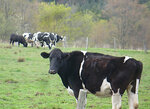SULLIVAN COUNTY – If only our dairy farmers had time to picket in Washington D.C.
Instead they must fertilize their fields, clean out barns, plant crops and milk cows – while across …
This item is available in full to subscribers.
Please log in to continue |


SULLIVAN COUNTY – If only our dairy farmers had time to picket in Washington D.C.
Instead they must fertilize their fields, clean out barns, plant crops and milk cows – while across the nation pro-farmers are watching the movement of a U.S. Senate bill that could authorize more of the farmers’ milk sold to schools nationwide.
“Any increased milk sales would be beneficial to farmers,” said Dave Weiss who, at age 74, milks 200 Holsteins a day on his Swan Lake farm. “Yes, that would be great for us.”
It was in 2012 that farmers nationwide lost the ability to sell “whole milk” to U.S. school cafeterias. Whole milk hasn’t had its fat content stripped as much as skimmed milk, for example.
But last December, the New York State Assembly and Senate both passed a bill named the Whole Milk for Healthy Kids Act, bringing back whole milk to school cafeterias. Then a few weeks later in Washington D.C., the U.S. House of Representatives agreed as well, in a vote of 330 to 99.
But the U.S. Senate has not yet given its okay, and “milk friends” across the U.S. are stepping up to push for healthy whole milk as part of the kids’ liquids.
The Whole Milk bill would modify restrictions that were put in place during the Obama administration. Tom Bose, Town of Callicoon supervisor and a Youngsville farmer, explains how the bill was enacted as part of Michelle Obama’s ‘Let’s Move’ initiative.
“It was thought to improve children’s health and lessen obesity in our young people,” Bose said.
The result was that the USDA (U.S. Department of Agriculture) outlawed whole milk completely in the nation’s school lunchrooms. In today’s schools, children are offered only fat-free and/or low-fat (1 percent) unflavored milk as part of their breakfasts and lunches. Other drinks for kids include flavored versions made with milk, sugar, flavorings and food coloring.
Whole milk was banned, and farmers got burned.
“Had (the USDA) followed the science,” said Bose, “they would have discovered what we have always known -- that whole milk is 97 percent fat free and one of the healthiest food choices that is naturally produced, and it tastes good. ‘Fat free’ has no proven health advantages when compared to the real thing.”
“It’s hard to put a value on the financial loss that our dairy farmers have endured since the enactment of that law,” said Bose.
Talking milk in D.C.
After the Dec.13 approval by the U.S. House of Representatives, U.S. Senator Roger Marshall, R-Kansas, moved to introduce a companion bill in the Senate.
House member Rep. Kim Schrier, a pediatrician, pushed for the Senate to pass the bill as well.
“A healthy diet early in life leads to proper physical growth, improved academic performance, and a strong foundation for healthy eating habits as an adult,” said Schrier, who hails from Washington State and is a Democrat.
“Whole milk is a filling, nutritious option that will help ensure that our children are well-fed and healthy. I have spent my career dedicated to the well-being of children and I know how important adequate nutrition is for growing kids.”
Rep. Glenn Thompson, a Republican from Pennsylvania and chairman of the House Committee on Agriculture, agreed:
“Milk is an essential building block for a well-rounded and balanced diet, offering 13 essential nutrients and numerous health benefits,” he said.
But chair of the U.S. Senate’s Agriculture Committee Sen. Debbie Stabenow, D-Mich., is standing firm against whole milk.
“Dairy is a very important part of a balanced meal,” Stabenow said, “but one thing that’s clear is that school-meal standards -- currently based on dietary science -- should continue to be based on dietary science, not based on which individual food product that we support.”
Agreeing with Stabenow is a national nonprofit, Physicians Committee for Responsible Medicine in Washington D.C.: “Allowing whole milk to be offered as part of school lunches is both unnecessary and harmful to children’s health,” says the Committee.
“Rising levels of obesity and type 2 diabetes – both linked to consumption of saturated fat, which is found in whole milk – highlights the need to feed our children healthy food and beverages beginning at the earliest life stages,” the Committee reported.” Whole milk provides no nutrients that cannot be found in other sources.”
IT’S ALL ABOUT CHOICE
Weighing in on the issue are dozens of small and large producers in the dairy industry. Launched in 1916, the National Milk Producers Federation (NMPF) in Arlington, Va., offers a podcast entitled “NMPF’S Larson on Whole Milk for Healthy Kids Act in Senate.” Claudia Larson is a senior director of government relations at NMPF.
U.S. dietary guidelines have for years recommended that people steer clear of whole milk, said Larson. But recent research has emerged that argues whole milk may be a healthier alternative to low-fat milk, she said.
“Currently,” said Larson, “we are looking to build more bipartisan support for the Whole Milk bill to demonstrate to the Senate that there is not only bipartisan support on the House side, but also broad support on the Senate side to move that bill and to get it across the finish line so schools can again have the option of serving 2% and whole milk in the school meal programs.”
To take effect, the law must get the OK from the Senate and then signed into law by U.S President Joe Biden. Said Larson: “I think there definitely is a real possibility that this bill becomes law this year -- it is an election year. We would expect it to probably have to move in the first half of the year, probably at least before August.”
Closer to home, dairy farmer Linda Kays of Callicoon says she can’t say enough about children’s needs for growth through cows’ whole milk.
“Kids need that 3.5 percent fat (in milk),” said Kays, who works with her husband and family. “Children need whole milk to grow and learn, and it’s nutritious. I’m all in favor of it.”
To support the Whole Milk for Healthy Kids Act, go to the website at International Dairy Foods Association at idfa.org/whole-milk-in-school-meals. The mailing address is 1250 H Street NW, Suite 900, Washington D.C. 20005.
Comments
No comments on this item Please log in to comment by clicking here